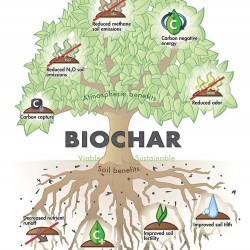
Biyokömürün Potansiyelini Açığa Çıkarmak: Doğanın Karbon Zengini Toprak İyileştiricisi
Biyokömür, odun yongaları, tarımsal atıklar veya mahsul kalıntıları gibi organik biyokütlenin pirolizinden üretilen karbon açısından zengin bir malzemedir. Bu eski toprak ıslahı, sayısız faydası nedeniyle modern tarımda ve çevresel restorasyonda popülerlik kazanmıştır.
Temel Faydaları:
- Toprak Sağlığını Güçlendirir: Toprağa katıldığında biyokömür uzun vadeli bir karbon yutağı görevi görerek toprak yapısını, verimliliği ve nem tutma özelliğini artırır. Gözenekli yapısı faydalı mikroorganizmalar için bir yaşam alanı sağlar ve besin döngüsünü teşvik ederek daha sağlıklı ve daha dirençli bitkilerle sonuçlanır.
- Karbon Tutulması: Biyokütleyi kararlı karbona dönüştüren biyokömür, atmosferdeki karbondioksiti tutarak iklim değişikliğini azaltmaya yardımcı olur. Bu karbon-negatif süreç, sera gazı emisyonlarının azaltılmasına yardımcı olur ve tarımsal ekosistemlerde iklim direncine katkıda bulunur.
- Su Kalitesinin İyileştirilmesi: Biyokömür, sudaki kirleticileri ve besin maddelerini adsorbe etme yeteneğine sahiptir, bu da onu tarımsal akış, yağmur suyu yönetimi ve atık su arıtımında su kalitesini iyileştirmek için etkili bir araç haline getirir. Sucul ekosistemlerde besin sızıntısını ve ötrofikasyonu azaltmaya yardımcı olarak daha temiz ve sağlıklı su yollarını teşvik eder.
- Yenilenebilir Enerji Kaynağı: Biyokömür üretmek için kullanılan piroliz işlemi aynı zamanda sentez gazı veya biyo-yağ şeklinde biyoenerji de üretir. Bu yenilenebilir enerji kaynağı ısı, elektrik üretimi veya biyoyakıt üretimi için kullanılabilir ve ek ekonomik ve çevresel faydalar sunar.
- Hayvancılık Faydaları: Toprağı iyileştirici özelliklerine ek olarak biyokömür, yem takviyesi olarak kullanıldığında çiftlik hayvanlarının sağlığına ve performansına fayda sağlayabilir. Toksinleri bağlayarak ve sindirim sisteminde besin emilimini artırarak, biyokömür gastrointestinal sağlığı destekleyebilir, enterik fermantasyondan kaynaklanan metan emisyonlarını azaltabilir ve geviş getiren hayvanlarda besin kullanımını artırabilir.
Sürdürülebilir Yaklaşımımız:
5Karbon olarak, sürdürülebilirlik ve çevre yönetimi konusunda kararlıyız. Biyokömür ürünlerimiz yenilenebilir biyokütle hammaddelerinden elde edilmekte ve çevre dostu süreçler kullanılarak üretilmektedir. Biyokömürün gücünden yararlanarak toprak sağlığını iyileştirmeye, iklim değişikliğini azaltmaya, su kalitesini artırmaya ve hem bitkilerin hem de hayvanların refahını teşvik etmeye çalışıyoruz.
Farkı Deneyimleyin:
Biyokömürün toprak sağlığı, karbon tutma, su kalitesini iyileştirme ve hayvancılık yönetimi için dönüştürücü potansiyelini keşfedin. Birinci sınıf biochar ürün yelpazemizi keşfedin ve gelecek nesiller için daha sürdürülebilir bir gelecek inşa etmede bize katılın.


